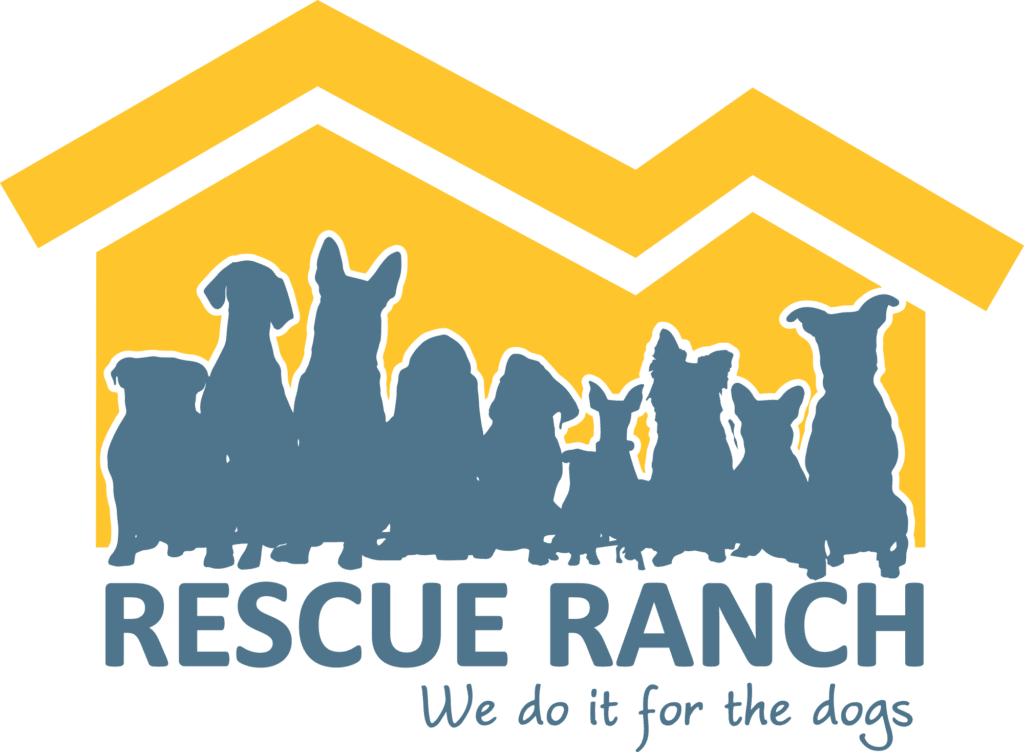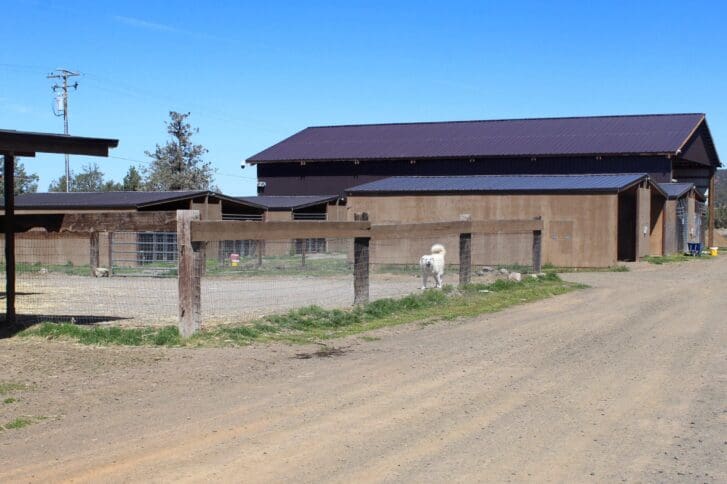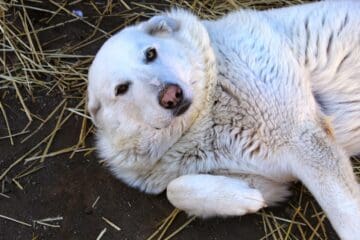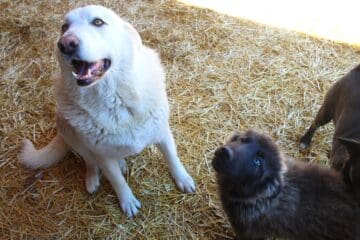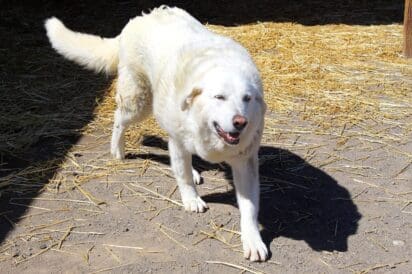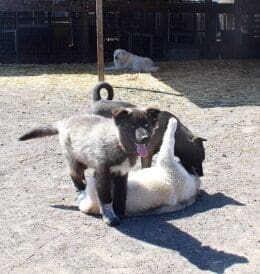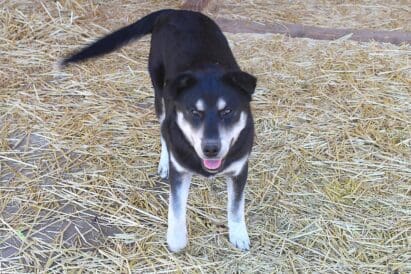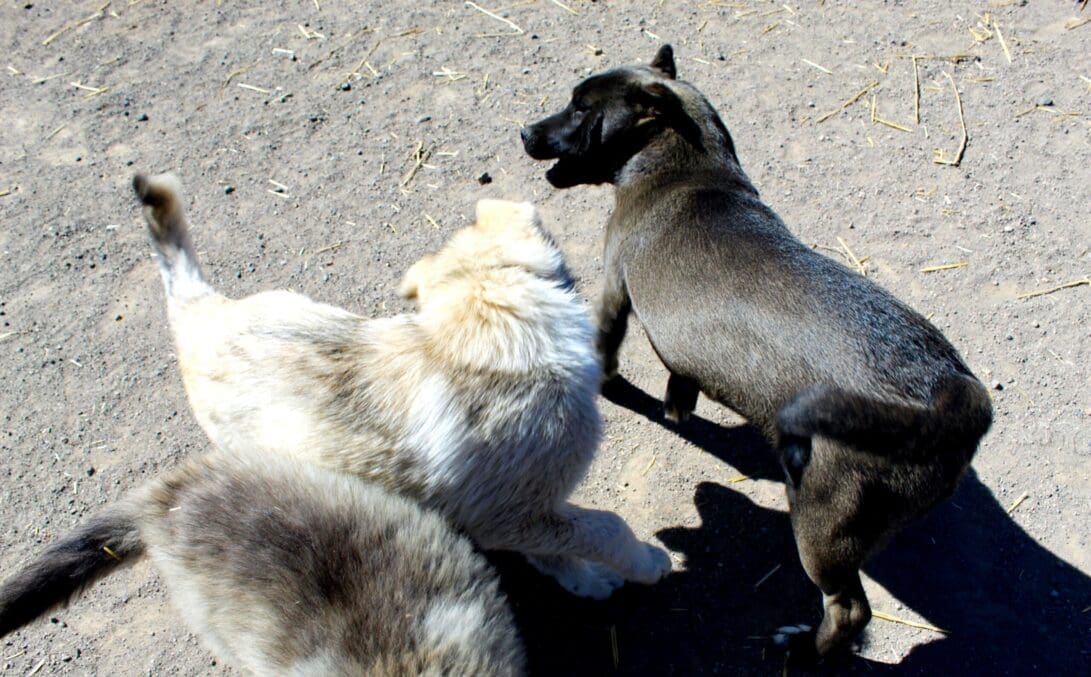Even as the seemingly unending stream of puppies continues, help has arrived from an unexpected quarter: Pyrenees dogs. Yes, last fall, Sanctuary staff discovered that this particular guardian breed consistently produces amazing nanny dogs: surrogate moms ready and able to help educate puppies in proper dog etiquette, as well as nurture and watch over them. I asked Operations Manager Laura Finley about the results so far. The short answer is that they’ve been godsend to the Rescue Ranch Puppy Program.
Nanny dogs help rescue puppies learn what it means to be a dog
Some mommas enjoy their pups so much they’re happy to spend extended time with them long after they’re weaned. Although most don’t take it that far, seasoned mothers frequently do a good job of educating their young. But not all females have a strong maternal instinct, especially first-timers. Many rescues arrive barely out of puppyhood themselves and can’t wean their hungry brood fast enough. Others might have more experience but aren’t necessarily equipped to pass on essential life skills. Then there are the puppies of all ages that come to us without a mother. They all need help learning what it means to be a dog.
We’ve discussed the benefits of puppy socialization with humans in a previous article about fostering, but learning proper dog etiquette is equally essential. When they are taught the ropes by a knowledgeable, patient parent or nanny, pups are more likely to grow into healthy, confident, dog-social adults. This not only contributes to their overall happiness, it also dramatically increases their adoptability.
Rescue Ranch routinely places puppies with talented caregiving surrogates, on an ad hoc basis, but they are up for adoption. What is new is that Pyrenees dogs have been introduced as permanent nannies to the Rescue Ranch Program. Essentially they have become canine staff members.
It all started with a little Sugar
I asked Laura how they had settled on Pyrenees dogs in particular. It all started with a three-and-a-half-year-old Pyrenees named Sugar, who came to the Sanctuary with collaborator and team member Karen Topping of Meghan’s House Rescue. Karen had been using her to help school youngsters in her program after noticing the dog’s uncanny ability to manage group dynamics. So it was decided to try her out with Sanctuary pups.
“We started last fall with Sugar. We’ve had whole litters and mixed litters go in with her. She just manages them. And she’s also there when they’re smaller, like 10 weeks old. She watches over them. She’s definitely there if a dog door-dashes somewhere on the property or if coyotes are in the area. Her livestock guardian instincts kick in. She let’s us know something is going on. No one is getting in her yard,” says Laura, “not that they’ve tried. We just know that when it’s Sugar alert-barking, it’s worth investigating.”
With Sugar’s success, Laura and her team decided to “hire” more nannies, which would be a win-win for all involved: “As the number of puppies expanded, many coming in older at 10-12 weeks old, we thought, Wow! this would be a great way to find a job for some of these rescue Pyrenees. We settled on Pyrenees dogs because that’s what we knew, and they have a little gentler nature than some of the bigger guardian breeds like Anatolians and such.”
3 more Pyrenees dogs join the team
In addition to the veteran, Sugar, the Sanctuary now has three more wonderful nannies in training: Meringue, Pita, and Rein. They’re part of our new canine staff, “paid in kibble and love,” says Laura.
Meringue
At roughly 11 months old, Meringue is a young tripod Pyrenees from the Fresno area. With only three legs, she wouldn’t have been a good candidate for adoption as a livestock guardian and was no doubt at the top of the euthanasia list. But Rescue Ranch pulled her from the shelter in time, and now she has a new purpose in life! “She was our first nanny save out of the Central Valley,” explains Laura. “Pyrenees show up a lot in the shelters down there.”
Meringue was a little camera shy when I visited. Like many dogs, she wasn’t fond of the strange contraption, the clicking shutter, or the sound of the auto-focus motor. But don’t let that fool you, she is a sweetheart and a very successful nanny. “She’s doing fantastic!” says Laura. “She’s on her third mixture of puppies. We’re not overwhelming her with lots at the moment.” On Tuesday, she was watching over two playful puppies in the 12-14 week age range.
Pita
Over a year old but still a young dog, Pita is also from the Central Valley. According to Laura, “She is super friendly and outgoing. We have her with some of our older shepherd and Malinois mixes; she’s doing great with them.”
Like Meringue, Pita is at an age where she still enjoys playing. When a human enters any area with puppies, the little tykes swarm towards them and are difficult to photograph. I tossed a ball around to get some shots, meeting with limited success. A couple were more interested in my shirt tails and camera strap. Eventually, they all joined in, including Pita, who even “stole” the tennis ball from one of the black puppies.
Rein
Rein appeared in our recent appeal to help offset rising numbers. She is a more mature four-to-five-year-old black and white Pyrenees. This girl was a transfer from Siskiyou County. What nobody knew was that she was carrying 11 Pyrenees pups! From her physical condition it was clear she had had more than one litter in the past, which was great from the Ranch’s perspective. A Pyrenees and an experienced mom, she was perfect for the program. Then, two weeks into her “training” with a set of puppies, staff realized that she would soon have a family of her own.
Six of Rein’s litter were girls, and I joked that Rescue Ranch was now staffed for the next 12 years. But the truth is that, while we all love the nannies and the puppies, we fervently hope that numbers will go down, not up.
In the meantime, Rescue Ranch is very proud of its new canine staff. With their unique combination of guardian and nurturing qualities these rescued Pyrenees dogs are valued team members and a wonderful complement to human caregivers.
